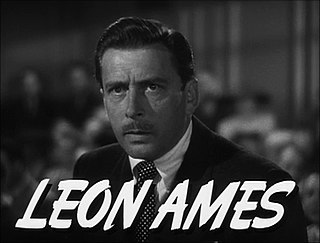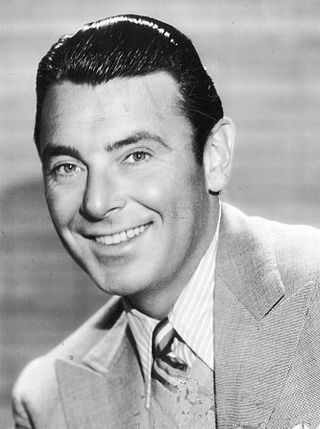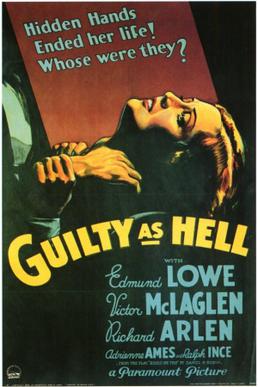
Ruth Chatterton was an American stage, film, and television actress, aviator and novelist. She was at her most popular in the early to mid-1930s, and in the same era gained prominence as an aviator, one of the few female pilots in the United States at the time. In the late 1930s, Chatterton retired from film acting but continued her career on the stage. She had several TV roles beginning in the late 1940s and became a successful novelist in the 1950s.

Leon Ames was an American film and television actor. He is best remembered for playing father figures in such films as Meet Me in St. Louis (1944), Little Women (1949), On Moonlight Bay (1951) and By the Light of the Silvery Moon (1953). His best-known dramatic role may have been in the crime film The Postman Always Rings Twice (1946).

Kay Francis was an American stage and film actress. After a brief period on Broadway in the late 1920s, she moved to film and achieved her greatest success between 1930 and 1936, when she was the number one female star and highest-paid actress at Warner Bros. studio. She adopted her mother's maiden name (Francis) as her professional surname.

George Brent was an Irish-American stage, film, and television actor. He is best remembered for the eleven films he made with Bette Davis, which included Jezebel and Dark Victory.

Ralph Forbes was an English film and stage actor active in Britain and the United States.
The House That Shadows Built (1931) is a feature compilation film from Paramount Pictures, made to celebrate the 20th anniversary of the studio's founding in 1912. The film was a promotional film for exhibitors and never had a regular theatrical release.
Hollywood on Parade (1932–1934) is a series of short subjects released by Paramount Pictures.

Robert Downing Ames was an American actor.

Lilly Turner is a 1933 American pre-Code melodrama directed by William A. Wellman, starring Ruth Chatterton and produced by First National Pictures. It is based on the 1932 play of the same name by Phillip Dunning and George Abbott. Warner Brothers attempted to reissue the film in 1936, but the Production Code Office denied them a certificate.

Three Sinners (1928) is a silent film directed by Rowland V. Lee, starring Pola Negri, and co-starring Warner Baxter, Olga Baclanova, and Paul Lukas.

Sins of the Fathers is a 1928 American sound part-talkie drama film produced by Famous Players–Lasky and released by Paramount Pictures. Like the majority of films during the early sound era, it was also issued in a silent version for theaters which were not yet wired for sound. The film was directed by Ludwig Berger and stars Emil Jannings and Ruth Chatterton in her motion picture debut.

No One Man is a 1932 American pre-Code drama film starring Carole Lombard and Ricardo Cortez, and directed by Lloyd Corrigan. It is based on a novel by Rupert Hughes.

The Right to Love is a 1930 American pre-Code drama film which was nominated at the 4th Academy Awards for Best Cinematography. It was based on Susan Glaspell's 1928 novel Brook Evans.
The Doctor's Secret is a 1929 American drama film directed by William C. deMille and written by William C. deMille. The film stars Ruth Chatterton, H. B. Warner, John Loder, Robert Edeson, Wilfred Noy and Ethel Wales. It is based on the 1913 play Half an Hour by J. M. Barrie. The film was released on January 26, 1929, by Paramount Pictures. As part of the policy of multiple-language versions during the early sound era, a separate Swedish version was produced at the Joinville Studios in Paris and released the following year.
The Dummy is a 1929 American pre-Code comedy film directed by Robert Milton and written by Harriet Ford, Harvey J. O'Higgins, Herman J. Mankiewicz and Joseph L. Mankiewicz. The film stars Fredric March, John Cromwell, Fred Kohler, Mickey Bennett, Vondell Darr, Jack Oakie and ZaSu Pitts. The film was released on March 9, 1929, by Paramount Pictures.

Anybody's Woman is a 1930 American pre-Code drama film directed by Dorothy Arzner and written by Zoe Akins, Doris Anderson, and Gouverneur Morris. The film stars Ruth Chatterton, Clive Brook, Paul Lukas, Huntley Gordon, Virginia Hammond, Tom Patricola, and Juliette Compton. The film was released on August 15, 1930, by Paramount Pictures.

Unfaithful is a 1931 American Pre-Code drama film directed by John Cromwell, written by Eve Unsell and John Van Druten, and starring Ruth Chatterton, Paul Lukas, Paul Cavanagh, Juliette Compton, Donald Cook and Emily Fitzroy. It was released on March 14, 1931, by Paramount Pictures.

Guilty as Hell is a 1932 American pre-Code mystery film directed by Erle C. Kenton and written by Arthur Kober and Frank Partos. The film stars Edmund Lowe, Victor McLaglen, Richard Arlen, Adrienne Ames, Henry Stephenson, Ralph Ince and Noel Francis. The film was released on August 5, 1932, by Paramount Pictures.

Walter Walker was an American actor of the stage and screen during the first half of the twentieth century. Born in New York City on March 13, 1864, Walker would have a career in theater prior to entering the film industry. By 1915 he was appearing in Broadway productions, his first being Sinners, written by Pulitzer Prize-winning playwright, Owen Davis. His film debut was in a leading role in 1917's American – That's All. He had a lengthy career, in both film and on stage, appearing in numerous plays and over 80 films. Walker died on December 4, 1947, in Honolulu, Hawaii.

It's Tough to Be Famous is a 1932 American pre-Code comedy film directed by Alfred E. Green and written by Robert Lord. The film stars Douglas Fairbanks, Jr., Mary Brian, Emma Dunn, Walter Catlett and David Landau. It was released by Warner Bros. on April 2, 1932.
















